Year 12 Common Module Study Guides
Learning methods available
Select a year to see available courses
Have you ever been disappointed with an internal assessment? Here's how you can bounce back!

Join 75,893 students who already have a head start.
"*" indicates required fields
James Ruse Agricultural High School and 99+ ATAR student, Sophia Dang shares how she went from being disappointed with her Internal Mark to scoring 97 External for HSC English Adv.
Name: Sophia Dang
School: James Ruse Agricultural High School
University course: Bachelor of Medical Studies/ Doctor of Medicine at the University of New South Wales (UNSW)
ATAR: 99.15
Hi! My name is Sophia, and I recently graduated from James Ruse. As someone who loves creativity and writing, my favourite subjects were English Advanced, Visual Arts and PDHPE.
Aside from studying, I volunteer at St John Ambulance and run an online art store with my mum and sister. In school, I was a member of the Prefect Body, and also coached the Girls’ Open Basketball team.
I know that Year 12 can come with so many different challenges – from always staying on top of your game, striving to find that ultimate ‘balance’ between studying and having fun, or perhaps, dealing with setbacks. So, in this article, I’ll be sharing some of my experiences studying for the HSC, where I learnt how to bounce back from disappointment, to boost my marks and my confidence.
Start HSC English confidently
Expert teachers, detailed feedback, one-to-one help! Learn from home with Matrix+ Online English courses.
I definitely had one of the strangest timetables during Year 12. I had morning classes 8 times a fortnight, which meant I had to wake up at 5:30 am every day!
However, I also had many free periods throughout the week, so I spent the majority of that time studying with my friends (although we always got distracted very easily) and catching up on homework.
I undertook the HSC Visual Arts course, which involved quite a bit of effort and dedication to create my major work. And so, this meant that I needed to balance between drawing and studying for all my other subjects.

As we all know, in June 2021, lockdown had hit us once again, and we were thrown back into online schooling. Suddenly, we were faced with silence and blank screens on Microsoft Team calls instead of the usual excitement buzzing in our classrooms.
So, I found that a really great way to keep myself happy and motivated was to call and study with my friends at 6:30 am. It not only held us accountable in terms of what tasks we needed to complete but also filled us with energy from the otherwise lack of social interaction during the lockdown.
Throughout Year 11 and most of Year 12, I had always enjoyed English. I loved to participate in class discussions, write about interesting concepts, challenge different perspectives, and had generally been achieving highly in most of my assessments.
However, there came a day when an email popped up on my phone. It read ‘Module C Assessment Results’. Excitedly, I clicked open the email, only to see a single-digit written on the top of my paper. The assessment was marked out of twenty.
I’m sure you can imagine the sheer shock and disappointment that followed. I checked, double-checked and even triple-checked to make sure that nothing had been missing, and that my mark had been written down correctly.
I didn’t know what to do. I knew I hadn’t received the best marks in a couple of assessments before, but nothing had ever been as shocking as this one – especially because this was in Year 12.
So, if you’re feeling this way, don’t worry. I understand what you are going through.
In school, we had four different assessment tasks for English Advanced:
Our task was to deliver a 5-minute presentation (and include a relevant poster) on our prescribed text, 1984 by George Orwell, and a related text.
Remember it is important to read your prescribed text at least twice!
I read my novel approximately three times:
This will not only broaden your understanding of the text but will help you gain new insights into ideas that may not have crossed your mind before.
Then, you need to focus on your presentation skills.
Be confident. Be engaging. Be insightful.
Are you speaking loud enough? Have you paced yourself well? Are you speaking with clarity and confidence?
You should always keep these aspects in mind for any multimodal presentation.

For Module A, I studied John Donne’s poetry (which included 8 different poems!) and Margaret Edson’s play, W;t.
I decided to research and annotate all eight poems before we studied them in class, which helped me develop a general understanding of the text. Instead of seeing the texts in class for the first time, I already had an overview of key concepts and ideas, which made analysing the play and poems significantly easier.
I also came across this Matrix article, ‘The Ultimate Donne and W;t Cheatsheet’ which provides a really useful summary of important plot points, ideas, and context and a useful annotated sample response.
Our Module C task involved writing either an imaginative, discursive or persuasive, as well as a reflection. It was a hand-in task, and we were given a stimulus – nothing too out of the ordinary.
I found that the most important thing you needed to do in your Common Module essay, is to always link back to the human experience.
What is the composer trying to convey? How does this link to the human experience? What do we, as audiences, learn from this?
Also, make sure you understand the key terms in the rubric (such as anomalies, paradoxes, inconsistencies, etc.) as they are often used in essay questions.
I’d say Module B is probably one of the most difficult modules in this course. And this is due to the extensive range of essay questions (that can often be quite eccentric too) that may be assessed.
Initially, I found it difficult to understand Shakespeare’s purpose when he wrote ‘King Henry IV’ (Why were there three different Henry’s, anyway?).
So, I read through this Matrix article ‘Module B: Understanding Henry IV Part 1 – Overview’ which clearly broke down the plot and concepts, and helped expand my understanding of the text.
And, to prepare me for the worst, I practised brainstorming and adapting to at least 25 different essay questions for my trial and HSC exams.
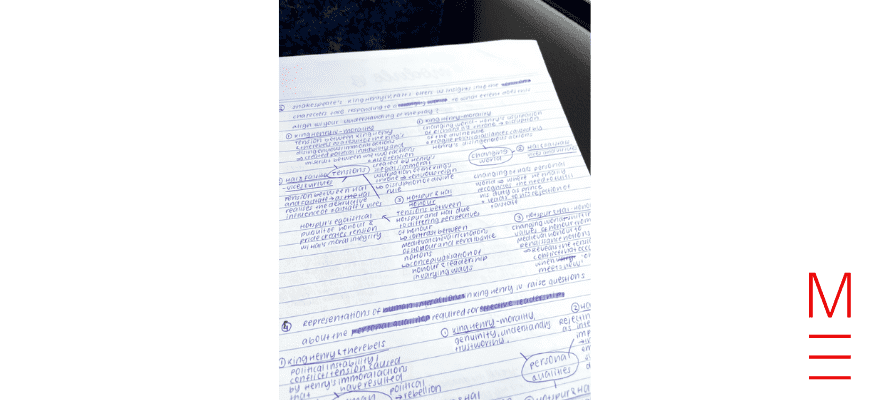
For our Module C assessment, we had to write either an imaginative, discursive or persuasive based on a given stimulus and a reflection.
I decided to write a discursive piece, which was probably not the best idea since I didn’t have much experience or practice writing in this textual form.
Unlike critical essays, creative writing never really did come naturally to me.
I always found myself struggling to come up with interesting, yet ‘non-cliché’ ideas while addressing the stimulus. Creative writing is also often subjective, and so it was often difficult to know what the markers were looking for.
And so, when I received my very low marks, I knew I wasn’t doing something right. No way would I have scored 97 external in English Adv if I continued to write like that.
I needed to change the way I approached the subject.
I knew I had to change things, so this is the process I followed.
After I had seen my marks for the Module C task, I knew I had to do something about it. And so, I decided to email my teacher, asking to schedule a Zoom meeting.
It is so important to always ask others for help, whether you’re performing exceptionally well, or find yourself struggling just a little. There is always room for improvement.
I bombarded my teacher with questions and asked her to review my hand-in assessment, as she explained to me what I had been doing wrong all this time.
So, if you find yourself lost, struggling, and simply have no idea what to do, or where to go from here – ask for feedback and guidance from your teacher, tutor, or peers. At Matrix, I found there were so many experienced teachers who specialise in English that could help me out.
Evidently, creative writing had been one of my weakest areas in English Advanced.
I decided to scrap all my past creatives and started writing up new drafts. I told my teacher and peers about all the different ideas I had brainstormed, which definitely helped me eliminate the ‘cliché’, less interesting ones.
From there, I created several drafts for my imaginative and discursive, ensuring to incorporate motifs and intertextual references, as well as embedding a meaningful purpose into my work.
But what’s the point of having a creative piece, without knowing how to adapt it to the stimulus?
So, I began looking for some Module C questions to brainstorm different ways I could change up my work to fit the stimulus. I found this article ‘20 Craft of Writing Practice Questions to Get You Mod C Ready’, which had been incredibly helpful in exposing me to a diverse range of stimuli.
So, just as I had, you’ve finished writing up all your draft essays and creatives.
What do you do now?
In exams, you can never expect the essay question or stimulus to be exactly the same as what you have prepared. And so, one of the most important aspects of preparing for English is actually practising to adapt to different questions.
This may seem like common sense. However, often, there are so many people who just regurgitate their pre-prepared responses and end up completely ignoring the exam question!
So, the steps that helped me score 97 external in the Eng Adv exam were:
1. Adapt
Find as many questions as you can for each module, and try brainstorming different ways you could adapt your argument or your creative piece to the essay question
By exposing yourself to a range of questions, not only will you feel more confident, but there may even be a chance that the question you’re looking at right now, is the one written in your exam.
2. Practise
Now that you have some idea of how you want to go about adapting your responses, the next step is to practise.
What does this mean?
You need to physically handwrite your response on paper, to really get a feel for what it would be like writing for 40-minutes, or even for two hours straight.
And so, one month leading up to the HSC, I made sure to practise writing my responses on paper as often as possible.
Not only will your writing speed increase, but the way that your mind thinks and responds to the exam question will also improve significantly.
3. Refine
It’s getting closer to the HSC now. What should you work on?
For me, I am a goal-setter, and love to tick off checkboxes whenever I have completed or achieved something. So, as the HSC exams were approaching, I had set out distinct goals which were aimed at improving and really refining my writing.
Since I felt quite confident in writing essays, I just focused on creating explicit links to the question and refined my written expression so that everything was clear and concise.
On the other hand, I made sure to continually practise writing out my Module C creative and reflection.
You can take a look at my objectives and to-do list below to see how I structured my goal plan.
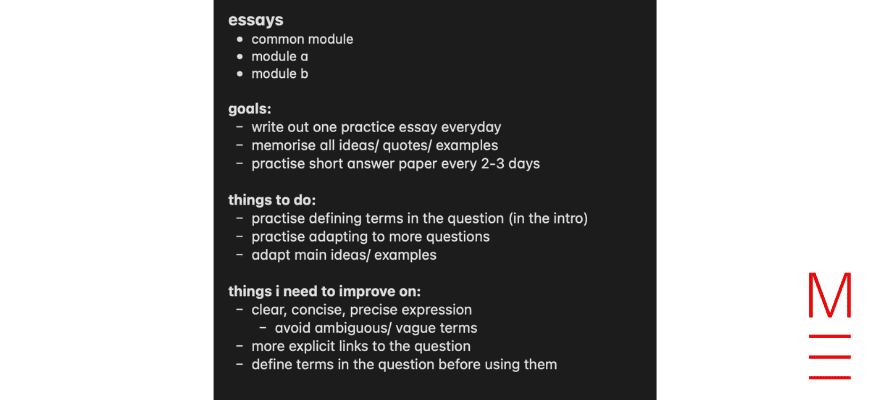
Ultimately, it is up to you to know where your strengths and weaknesses lie.
I’d say, focus on refining your skills as your exams approach, to really make sure that you can score the highest external marks in Eng Adv as possible.
Having a pre-prepared essay can only get you so far. So, on top of my essays, I also prepared a quote bank for each module, which covered varying concepts and served different purposes (for example, quotes based on text form or characters)
I practised switching these additional quotes in and out of my essay, depending on whether or not my original arguments suited the essay question.
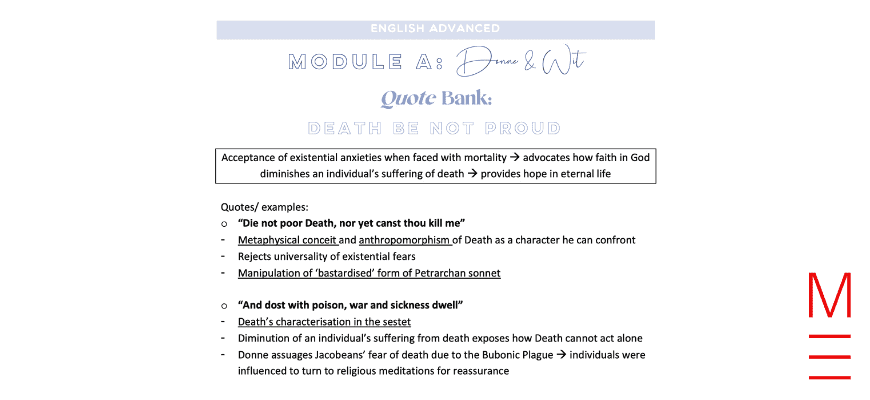
The earlier you start memorising, the easier it will be to recall information in the exam.
At least two months leading up to the HSC, I started memorising my essay quotes and analysis. This meant that I didn’t need to stare blankly at my exam paper trying to remember Shakespeare’s quote. Instead, I could dedicate all my focus to writing my essay and adapting to the exam question.
Every day, I would randomly choose a few essay questions and create a mind map brainstorming ideas on how to adapt my arguments to the question.
Here is a list of interesting essay questions I used to practise adapting my essay with, from the Matrix article ‘31 Module B Practice Essay Questions to Save Your HSC’ that covers a range of different prescribed texts.
Since my Module A text had eight different poems, I summarised all of Donne’s poems and made sure I had a general understanding of each poem – in case the exam specified a particular poem in the question. After adapting to questions on mindmaps, I practised writing full essays under timed conditions approximately two months before the HSC.
Starting early is so important, as you need to get comfortable with constantly writing and thinking on the spot.
Now, there is no set way to prepare for Module C.
I prepared two imaginative and one discursive piece, each with a reflection. However, you could also memorise all your past creatives and use whichever is best suited for the exam stimulus.
Having learnt from my Module C Assessment, I edited my work over and over again and continually asked for feedback.
I’d say that Module C was one of the most difficult modules to prepare for since there is such a diverse range of stimuli that could potentially be assessed. So, I compiled a long list of different stimuli then brainstormed ways to adapt my ideas. If one of my creatives didn’t fit into the stimulus, I’d try and think of ways to adapt my other works.
That’s why it is so important to either have multiple pieces you can choose between or an extremely flexible creative that can be moulded to any stimulus.
Improving my Module C marks was crucial to score highly in the Eng Adv exam.
I was actually one of the leaders of the English Advanced Study Group in my school, which involved preparing and delivering lessons to my peers.
This meant that I had to consolidate all my notes, as well as ensure that I had a solid understanding of all the texts and materials.
This not only allowed me to provide others with guidance but also helped me gain new perspectives on different concepts, as we bounced interesting ideas back and forth throughout the lessons.
Don’t neglect the short answer section in Paper 1.
The short answer section of Paper 1 is actually worth twenty marks!
That is why it is so important to start practising early to get a feel for the type of questions that are usually assessed. Not only must you read and understand texts quickly, but you also need to interpret them in response to the question posed.
By the time HSC came around, I had completed at least ten different short answer papers. At first, I struggled to finish within the allocated 40-minute time limit. However, as I continued practising, I gradually began to read, think and write with speed and more ease.
Aside from completing these past papers, I brainstormed a variety of terms and phrases to incorporate throughout my responses. Having an extensive vocabulary, as well as understanding how to link back to the human experience is essential to enhance your response.
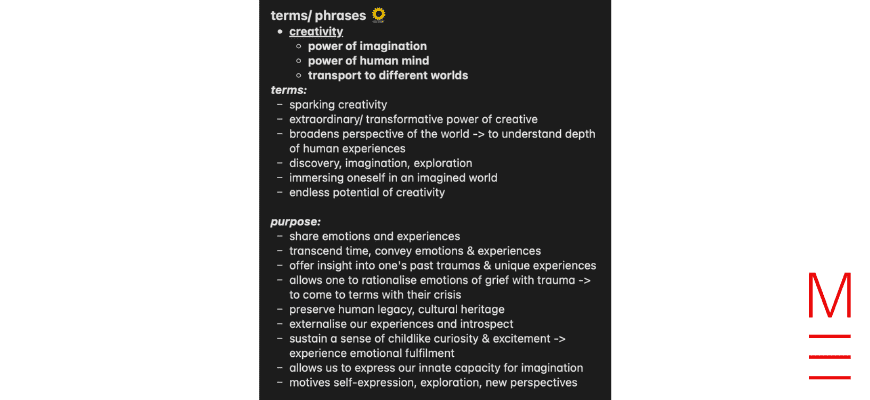
From refining my responses, adapting to essay questions, and practising writing under timed conditions – I’d say English occupied the majority of my study time.
And with balancing my Visual Arts major work, doing some Maths questions, all while trying to understand concepts in Chemistry, I knew I had to somehow manage my time effectively.
As weeks led up to the HSC, I dedicated each day to a particular subject, then worked on other subject tasks in my spare time.
Here is an example of how I have organised my schedule a couple of weeks leading up to the HSC using Notion.
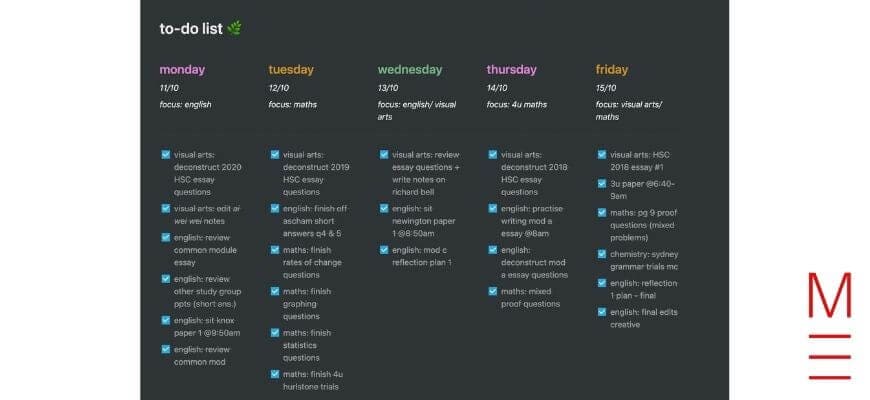
You definitely don’t have to follow how I have approached my studies or organised my schedule. Everyone is different, so do whatever works best for you.
I’m sure you’ll find that Year 12 and particularly your HSC exams will pass by like a breeze.
Just remember to take it easy, be kind to yourself, and don’t lose hope!
Written by Matrix Education
Matrix is Sydney's No.1 High School Tuition provider. Come read our blog regularly for study hacks, subject breakdowns, and all the other academic insights you need.© Matrix Education and www.matrix.edu.au, 2023. Unauthorised use and/or duplication of this material without express and written permission from this site’s author and/or owner is strictly prohibited. Excerpts and links may be used, provided that full and clear credit is given to Matrix Education and www.matrix.edu.au with appropriate and specific direction to the original content.